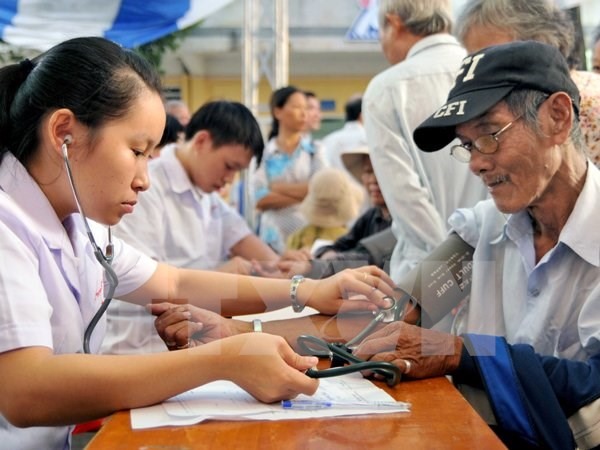 Society
Society

Statistics from countries whose senior citizens continue working show no increase in unemployment rate of young workers, an official of the United Nations Population Fund (UNFPA) in Việt Nam said.
 |
| Medical workers provide free health checkups for senior citizens. — VNA/VNS Photo |
HÀ NỘI — Statistics from countries whose senior citizens continue working show no increase in unemployment rate of young workers, an official of the United Nations Population Fund (UNFPA) in Việt Nam said.
Information from the 2017 Global Symposium on Ageing was shared among population and old people experts at a conference held in Hà Nội yesterday.
The symposium, hosted by UNFPA in October in Korea, reviewed and appraised progress 15 years after the adoption of the 2002 Madrid International Plan of Action on Ageing (MIPAA).
"Reports presented at the symposium have shown a global trend in population ageing, even in countries considered to have a young population," Dr Nguyễn Ngọc Quỳnh, a UNFPA social protection analyst, said at the conference.
It requires extensive efforts from countries to adapt to the trend, even though they are in different stages of the ageing process, according to the expert.
This includes a comprehensive labour policy reform geared towards “active ageing,” which is the process of optimising opportunities for health, participation and security to enhance the quality of life as people age, according to the World Health Organisation.
It should include pension system reforms and elimination of labour market barriers and labour incentive policies for old citizens.
“Reports from different countries show that an ageing population does not create a labour shortage, since a large number of senior citizens want – and still have the ability – to continue working,” Quỳnh said.
“They also show that working senior citizens do not increase unemployment rate of young workers,” she said. “Studies in China show that working senior citizens even create jobs in the service industry, since they are still making money and have the needs to spend money.”
There are some 10 million senior citizens in Việt Nam, accounting for 11 per cent of the total population. Việt Nam is among the 10 countries with the fastest speed of ageing in the world, according to the Ministry of Health.
"By classifying ’senior citizens’ as 60 years old and above, Việt Nam will waste a large number of labour force that can still contribute to the development of the country," Quỳnh added.
"There is a shortage of statistics to demonstrate how different countries protect the rights of older people," Dr Nguyễn Văn Tiên, former vice chairman of the National Assembly’s Committee on Social Affairs, said.
He noted that out of the 133 countries that a group of international experts from the United Nations and NGOs studied since 2011, only 22 countries – or 17 per cent – had conducted surveys on the rights of older people.
The 2002 MIPAA, adopted at the Second World Assembly on Ageing in April 2002, does not have enough legal power to protect those rights.
The studies also found out that senior citizens are subject to various types of discrimination, including domestic violence, sexual violence and abandonment.
Trần Bích Thủy, director of HelpAge International in Việt Nam, proposed the formation of a consultant group on population ageing in Việt Nam, which is aimed at facilitating the country’s efforts to adapt to such a trend in 2018-21.
“The group is founded on the grounds of sharing information, coordinating efforts and policy advocacy on population ageing,” she said. “Although voluntary and informal, the group will play the role of a consultant to the National Committee on Ageing (VNCA).”
A proposal of the group’s formation would be submitted to VNCA by the end of this year, she added. The group would start working next year, if approved by VNCA. — VNS